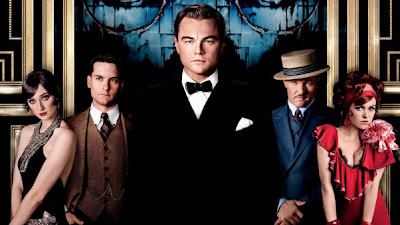F. Scott Fitzgerald’s classic novella of the ‘Jazz
Age’ (a term coined by Fitzgerald himself) returns to the big screen once
again, this time starring Leonardo Di Caprio as the ambiguous Jay Gatsby and
Carey Mulligan as the delicate socialite Daisy Buchanan, the object of Gatsby’s
dream.
Differing from the book, The Great Gatsby is narrated in flashbacks by the “morbidly alcoholic” Nick Carraway (Tobey Maguire) who has been submitted to a sanatorium for his depression and anxiety, an interesting 21st century take on the Prohibition era. Despite this, the script sticks reasonably close to Fitzgerald’s prose. Nick recalls renting a house in the West Egg district of Long Island in the summer of 1922, next door to the mysterious millionaire bootlegger, Gatsby. Across the bay at East Egg are the houses of the ‘old money’ people, including Tom (Joel Edgerton) and Daisy Buchanan, whom Gatsby courted as an officer in the first world war.
Like Gatsby himself, Baz Luhrmann’s take on the
story is excessive and overstated. This works particularly well during the party
scenes which Nick appropriately compares to “an amusement park.” Gatsby has, of
course, planned his parties to perfection in order to impress Daisy. By building
his life around the shallow, fickle Daisy, Gatsby surrenders his extraordinary
power of visionary hope to the simple task of acquiring immense wealth. Gatsby’s
dream is diminished to a motivation for material gain because the object of his
dream is unworthy of his power of dreaming, the characteristic that makes him
“great” in the first place.
Differing from the book, The Great Gatsby is narrated in flashbacks by the “morbidly alcoholic” Nick Carraway (Tobey Maguire) who has been submitted to a sanatorium for his depression and anxiety, an interesting 21st century take on the Prohibition era. Despite this, the script sticks reasonably close to Fitzgerald’s prose. Nick recalls renting a house in the West Egg district of Long Island in the summer of 1922, next door to the mysterious millionaire bootlegger, Gatsby. Across the bay at East Egg are the houses of the ‘old money’ people, including Tom (Joel Edgerton) and Daisy Buchanan, whom Gatsby courted as an officer in the first world war.
 |
| Carey Mulligan as Daisy and Leonardo Di Caprio as Gatsby. |
Di Caprio makes a fantastic Gatsby, ironic, desperate
and enigmatic in exactly the way Gatsby should be. The irony surrounding
Gatsby’s character is clear: he throws lavish parties that he doesn't attend;
he’s a bootlegger who doesn't drink; a pool owner who doesn't use his pool
(apart from at the very end, of course) and a man of leisure who doesn't take
part in any leisurely activities.
 Mulligan conveys Daisy’s superficiality and
vulnerability yet seems almost too likable for the role of Daisy who, along
with Tom, is so careless that she allows “other people [to] clean up the mess
[she] had made.” The poverty of George and Myrtle Wilson (Jason Clarke and Isla
Fisher) at the Valley of the Ashes effectively serves as a stark contrast to
the carefree lifestyle of Gatsby and the Buchanans. Despite playing a minor
role in the film, Amitabh Bachchan shines as Gatsby’s corrupt business partner,
Meyer Wolfsheim and finally, Elizabeth Debicki is just right for the role of
the pessimistic young golfer, Jordan Baker, or “the single most terrifying
person” Nick has ever met.
Mulligan conveys Daisy’s superficiality and
vulnerability yet seems almost too likable for the role of Daisy who, along
with Tom, is so careless that she allows “other people [to] clean up the mess
[she] had made.” The poverty of George and Myrtle Wilson (Jason Clarke and Isla
Fisher) at the Valley of the Ashes effectively serves as a stark contrast to
the carefree lifestyle of Gatsby and the Buchanans. Despite playing a minor
role in the film, Amitabh Bachchan shines as Gatsby’s corrupt business partner,
Meyer Wolfsheim and finally, Elizabeth Debicki is just right for the role of
the pessimistic young golfer, Jordan Baker, or “the single most terrifying
person” Nick has ever met.

Luhrmann’s version of this classic tale is
entertaining but by no means lives up to Gatsby, the novel. Published in 1925,
Fitzgerald’s masterpiece was ahead of its time as a story about dreams: the
flawed nature of the American dream in an era of artifice and illusion; Gatsby’s
failure to realise that his dream of a future with Daisy is the wrong dream;
the transcending power of our own dreams and imagination and our ability to
hold onto hope in unfortunate circumstances.